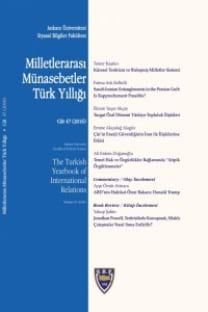Patterns of Political Modernization and Turkish Democracy
One of Britain's most realistic writers, G. Orwell, said onone occasion "In the case of a word like democracy not only isthere no agreed definition, but the attempt to make one isresisted from ali sides..."1 Nevertheless, if defining democracymerely signifies giving the meaning of the word, the problemis quickly solved, for ali that is required is some knowledge ofGreek. Literally democracy means "power of the people", thatthe power belongs to the people. However, we also have to askwhat the term stands for. In 1949 a UNESCO inquiry into ideological conflicts concerning democracy issued the followingstatement: "For the first time in the history of the world, 110-doctrines are advanced as anti-democratic. Practical politiciansand political theorist agree in stressing the democratic elementin the institutions they' defend and the theories they advocate.This acceptance of democracy as the highest form of politicalor social organization is the sign of a basic agreement in theultimate aims of modern social and political institutions."2 Yetthe term continues to preoccupy political scientists and politicalphilosophers. The reason lies most probably in the undeniablefact, that the majör components of democracy such as equality,self government, sovereignity, representation, majority ruleencompass according to the prevailing "Zeitgeisf'a differentmeaning.
Anahtar Kelimeler:
Patterns, Political Modernization, Turkish Democracy
Patterns of Political Modernization and Turkish Democracy
- ISSN: 0544-1943
- Yayın Aralığı: Yıllık
- Başlangıç: 1960
- Yayıncı: Ankara Üniversitesi Siyasal Bilgiler Fakültesi Uluslararası İlişkiler Bölümü
Sayıdaki Diğer Makaleler
World Bank on Public Investment Program of Turkey: Review of a Report
WERE THE ASSYRIANS REALLY PERSECUTED
Patterns of Political Modernization and Turkish Democracy
Atatürk's Reforms: Realization of a Utopia by a Realist
L'Utilisation des Eaux Palestiennes et le Droit International
Zionist Plans and Cyprus 1896-1948
